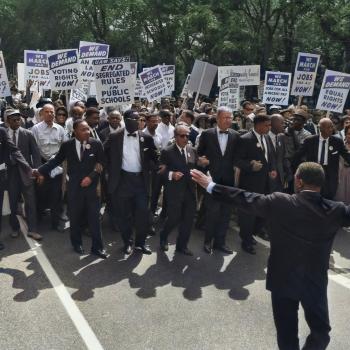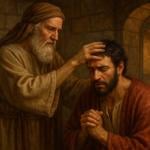You will know the truth, and the truth will set you free. – John 8:32
The truth is supposed to set us free, but often it seems that a battle is raging and the truth is at stake. How can we possibly know what to believe when we are bombarded with so many versions of the truth?

For those of us who call ourselves Christians, we look to the Bible as our foundation, but – let’s be honest – the Bible can be pretty confusing and complex. And looking for guidance on what those holy Scriptures mean can lead us to endless interpretations. Our religious traditions can provide a framework for our understanding of truth, but the vast number of denominations should be a signal that no single one can possibly hold the key to absolute truth.
Though we might be overwhelmed by the various claims of truth, I wonder if the problem is not so much about the extensive array of perspectives but that we haven’t learned how to sift through them all. The journey to truth often takes us through the tension and the wrestling, but maybe we’re more content to grip onto the version of truth that suits us while throwing our stones at those who would offer a different viewpoint.
Before we can even begin to determine what’s true, I think it’s important to first take a look at the barriers that stand in the way. What follows is not an exhaustive list but just a few of the barriers that I’ve experienced myself and have seen at play in those around me.
Barrier #1: Fear
While there are so many values to religion and belonging in a religious community, fear is often a shadow that follows closely behind. For those who want to explore their questions and doubts, it’s often done quietly and with some hesitation. We often feel a lot of fear about breaking away from our tradition. We fear rejection. We fear hell. We fear that if one piece of our paradigm is pulled out that it will all topple like a Jenga tower.
But fear does not come from God. Fear has more to do with power and control. Sometimes it has to do with those in power trying to control others (which is not always done in a sinister or intentional way). Sometimes it has to do with us grasping for power and control over our environments and lives because that helps us feel safe and secure. When we are led by the need to maintain some sense of control, any perspective that comes against our own will feel like a threat.
But, as pastor and theologian Greg Boyd writes, “What does truth have to fear?” Boyd proposes that maybe our animosity toward other perspectives is motivated by the fear that that perspective “might turn out to be more compelling than [we] can handle.”
If we are so afraid that the truth will be threatened, maybe the belief that we hold isn’t really true. If we are honestly seeking truth, not power or control, we really don’t need to fear viewpoints that are different from our own. We can learn to listen, question what doesn’t feel right, and discern what makes sense within the broader narrative of our faith.
Barrier #2: Labels
Our fear is often bolstered by the labels that we create. Very naturally, we create categories for different groups of people and different types of ideas. This isn’t dangerous in itself and can actually serve a valuable purpose of helping us to organize information in our minds. However, the danger comes in when we weaponize these categories or allow them to taint our view of the people to whom we’ve ascribed them.
When we make assumptions about the people or perspectives within the categories we’ve created, we often judge those who are most like us in a positive light while discrediting or devaluing those who don’t fit into our own camps. Very quickly categories such as conservative, liberal, Evangelical, or Progressive can turn into labels like heretic or false teacher. In so doing, we fail to recognize both the image of God in the opposing group and the valuable insight that they could potentially offer. In addition, we invoke more fear within our own groups, dissuading individuals from ever asking any questions that might be given the same disparaging labels.
At best, we simply ignore the viewpoints of those we have labeled as bad. At worst, we become violent toward them (either physically or verbally), just as we see in the story of Jesus, when he told the Pharisees, “You are ready to kill me because you have no room for my word” (John 8:37).
We have to understand that no one (other than God himself) has a monopoly on truth. The leaders we listen to and the groups that we are a part of are doing their best to make sense of God, the Bible, and the world that we live in, but they’re bound to get it wrong sometimes. Those with whom we often disagree are also doing their best to make sense of God, the Bible, and the world, and they will have some important insight to offer at times. We have to be willing to investigate the labels that we place on others and not let them determine the value of another human being.
Barrier #3: Desire for Certainty
Along with fear and the labels we create comes a very natural desire for certainty. As humans, we hate ambiguity. It’s uncomfortable, disorienting, and exhausting. These are all things that I felt as I started to deconstruct my own faith. I understand that so often we would rather cling to what we think we know than have to deal with uncertainty and the negative emotions that come along with it.
In Christena Cleveland’s book, Disunity in Christ, she talks about Arie Kruglanski’s research on our need for cognitive closure, which means that we desire “a firm answer to a question, any firm answer as opposed to confusion and/or ambiguity.”
Cleveland explains it this way…
Because we’re uncomfortable with ambiguity, if we can find a concept to help us make sense of the world, we will cling to it – even if the concept is incomplete. We want to quickly close the door to ambiguity because it threatens who we are. In our brazen attempts to make sense of the world, we prefer to settle for an answer even if it’s not the answer. When we encounter different cultural perspectives, the number of possible “answers” is increased and so is ambiguity. Naturally, we want to squelch those pesky different perspectives.
Our desire to have it all figured out and the pride in thinking that we possibly could is actually a hindrance to discovering the truth. Such a narrow view that doesn’t allow for doubt often leads people to live in fear and blindly accept everything they’re taught from their leaders whose wisdom and knowledge is limited. Throughout the Bible we read about the mystery of God, and we see in 1 Corinthians 13:8-12 that we only “know in part” right now, but that natural desire for certainty is so strong that we often reject any room for doubt or questions or gray space.
As Anne Lamott reminds us, “The opposite of faith is not doubt, but certainty.” If we claim to be people of faith, we must learn to embrace the mystery and tension and ambiguity. We must learn to admit that we could never comprehend the depths of who God is and what he wants for us until the time that his restoration of our broken world is complete. We can and should keep seeking truth while knowing that we won’t be able to fully grasp it.
We are all doing our best to understand a God who cannot be contained in the boxes we create and a world that is full of complexities. Acknowledging that is actually a really good place to start on our quest for truth.












